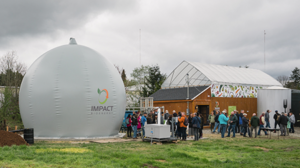New Industrial Symbiosis grants support collaborative projects advancing the circular economy
OLYMPIA, WA — The Washington State Department of Commerce today announced $850,000 in grants to four projects in support of new and exciting efforts to find beneficial uses for industrial waste. In this first year of the Industrial Symbiosis Program, funded projects range from research and development to on-the-ground implementation. Competitive grants announced today are:
- Inland Empire Paper Company (Spokane) is awarded $250,000 to expand the use of their waste fly ash for the benefit of soil health. Fly ash will be transformed into a usable form that can be efficiently delivered to agricultural soils using conventional farm equipment. Fly ash neutralizes acidic soils and supplies essential minerals providing a significant benefit to crop yields.
- Qualterra (formerly NuPhY) (Spangle) is awarded $245,416 to produce biochar from agricultural and forest waste biomass while creating renewable energy. The project will also provide mixtures of biochar and fly ash as soil amendments for Washington farmers to maintain soil health and increase crop productivity.
- Myno Carbon, based in Bainbridge Island, is awarded $250,000 to develop a carbon removal facility in Eastern Washington that will create biochar and carbon-negative electricity. In addition, waste CO2 will be captured with crushed basalt to create a liming agent beneficial to soil health.
-

Impact Bioenergy, Vashon Island, will deliver renewable natural gas (RNG) to a local food manufacturing plant and capture waste heat from the facility to manufacture certified organic dry fertilizer, thanks in part to a grant from Commerce’s new Industrial Symbiosis program. Impact Bioenergy (Vashon Island) is awarded $104,584 to deliver renewable natural gas (RNG) to a local food manufacturing plant and capture waste heat from the facility to manufacture certified organic dry fertilizer.
Washington state is building a stronger circular economy – one that is sustainable, integrated, climate-friendly and profitable – by decoupling growth from the consumption of finite resources. Industrial symbiosis is one tool from a set of forward-looking ideas and applications demonstrating that growth does not have to equal waste. Innovation is happening around the world to advance this idea and the state of Washington is developing opportunities to accelerate it.
“We are excited to start this new program in Washington state, said Chris Green, Commerce Assistant Director, Office of Economic Development and Competitiveness. “These opportunities exist all over our state and demonstrate a spirit of innovation and collaboration, particularly with respect to clean technology that supports our farmers.”
Industrial symbiosis includes waste, by-products, residues, energy and water. The state program seeks to go beyond waste reduction by turning waste into a valued resource which benefits the producer, and stimulates new business opportunities and profitability that support the circular economy.
This new program looks across the state to expand existing industrial symbiosis efforts, assist others that are on their way, and support those still on the drawing board.
“This new program hits the mark for industries that see the potential to beneficially reuse their waste streams,” said Doug Krapas, Environmental Manager for grant recipient Inland Empire Paper. “With this support, IEP will continue our innovative effort to turn waste fly ash into an important soil amendment for our regional farmers.”
While there are different strategies to help businesses find new uses for their waste, the goal is the same – to achieve mutual benefit for those creating the waste and those receiving it. More information is available on Commerce’s website.
###